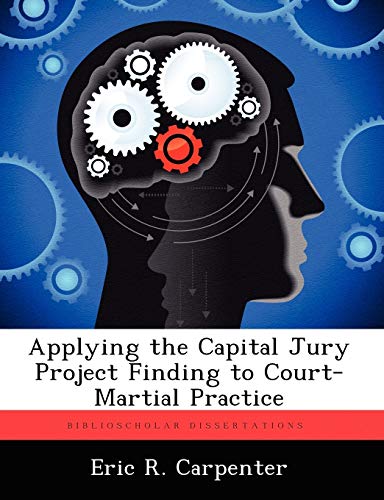Verwandte Artikel zu Applying the Capital Jury Project Finding to Court-Martial...

Inhaltsangabe
Starting in 1991, a consortium of criminologists, social psychologists, and law school professors began researching how jurors in capital cases come to their decisions. This body of work, called the Capital Jury Project (CJP), found several trends related to what motivates jurors to either vote for life or death; how jurors interact with one another and what dynamics influence their social relationships; whether jurors understand the law; and whether jurors accept responsibility for their decisions. No such research has been conducted on military panel members. Can military justice practitioners look to the CJP to guide them in framing issues for the panel members? Is there any historical evidence that panel members in capital cases follow the same trends identified by the CJP? How should military practitioners interpret and apply the military-specific procedural rules in light of the CJP findings? This thesis surveys the CJP findings, indentifies examples of the CJP findings in military cases, and then argues that military justice practioners should modify their practice to reflect what the Capital Jury Project has revealed about juror beliefs about aggravation and mitigation; jury dynamics; juror confusion; jury decision making; and juror responsibility.
Die Inhaltsangabe kann sich auf eine andere Ausgabe dieses Titels beziehen.
Reseña del editor
Starting in 1991, a consortium of criminologists, social psychologists, and law school professors began researching how jurors in capital cases come to their decisions. This body of work, called the Capital Jury Project (CJP), found several trends related to what motivates jurors to either vote for life or death; how jurors interact with one another and what dynamics influence their social relationships; whether jurors understand the law; and whether jurors accept responsibility for their decisions. No such research has been conducted on military panel members. Can military justice practitioners look to the CJP to guide them in framing issues for the panel members? Is there any historical evidence that panel members in capital cases follow the same trends identified by the CJP? How should military practitioners interpret and apply the military-specific procedural rules in light of the CJP findings? This thesis surveys the CJP findings, indentifies examples of the CJP findings in military cases, and then argues that military justice practioners should modify their practice to reflect what the Capital Jury Project has revealed about juror beliefs about aggravation and mitigation; jury dynamics; juror confusion; jury decision making; and juror responsibility.
„Über diesen Titel“ kann sich auf eine andere Ausgabe dieses Titels beziehen.
- VerlagBiblioScholar
- Erscheinungsdatum2012
- ISBN 10 124982706X
- ISBN 13 9781249827061
- EinbandTapa blanda
- SpracheEnglisch
- Anzahl der Seiten90
- Kontakt zum HerstellerNicht verfügbar
Neu kaufen
Diesen Artikel anzeigenEUR 5,91 für den Versand von Vereinigtes Königreich nach Deutschland
Versandziele, Kosten & DauerSuchergebnisse für Applying the Capital Jury Project Finding to Court-Martial...
Applying the Capital Jury Project Finding to Court-Martial Practice
Anbieter: Ria Christie Collections, Uxbridge, Vereinigtes Königreich
Zustand: New. In. Artikel-Nr. ria9781249827061_new
Anzahl: Mehr als 20 verfügbar
Applying the Capital Jury Project Finding to Court-Martial Practice
Anbieter: moluna, Greven, Deutschland
Zustand: New. KlappentextrnrnStarting in 1991, a consortium of criminologists, social psychologists, and law school professors began researching how jurors in capital cases come to their decisions. This body of work, called the Capital Jury Project (CJP), fou. Artikel-Nr. 6488730
Anzahl: Mehr als 20 verfügbar
Applying the Capital Jury Project Finding to Court-Martial Practice
Anbieter: AHA-BUCH GmbH, Einbeck, Deutschland
Taschenbuch. Zustand: Neu. Neuware - Starting in 1991, a consortium of criminologists, social psychologists, and law school professors began researching how jurors in capital cases come to their decisions. This body of work, called the Capital Jury Project (CJP), found several trends related to what motivates jurors to either vote for life or death; how jurors interact with one another and what dynamics influence their social relationships; whether jurors understand the law; and whether jurors accept responsibility for their decisions. No such research has been conducted on military panel members. Can military justice practitioners look to the CJP to guide them in framing issues for the panel members Is there any historical evidence that panel members in capital cases follow the same trends identified by the CJP How should military practitioners interpret and apply the military-specific procedural rules in light of the CJP findings This thesis surveys the CJP findings, indentifies examples of the CJP findings in military cases, and then argues that military justice practioners should modify their practice to reflect what the Capital Jury Project has revealed about juror beliefs about aggravation and mitigation; jury dynamics; juror confusion; jury decision making; and juror responsibility. Artikel-Nr. 9781249827061
Anzahl: 2 verfügbar
